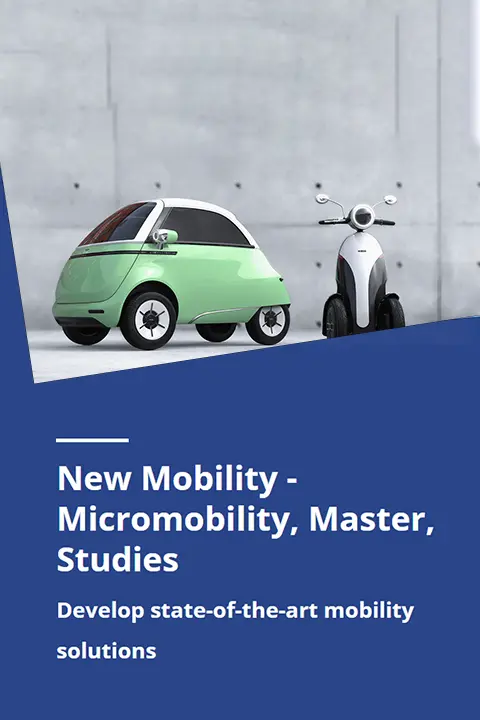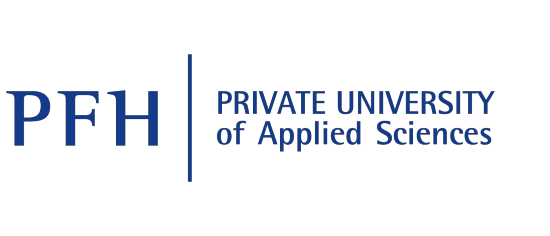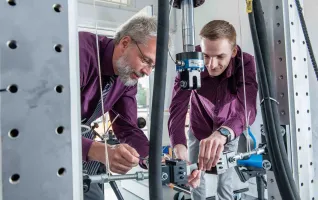

New Mobility - Micromobility

A career in sustainable and modern mobility options
For you, deciding between car, bus or train is ancient history? Are you interested in sustainable ways of getting around? The Master’s study programme New Mobility – Micromobility provides a study programme in a growing and future-oriented subject area. The Master’s programme is aimed at engineers from a wide range of disciplines as well as designers who are enthusiastic about materials, locomotion and lightweight construction.
The study programme offers the best professional conditions thanks to the special expertise in lightweight construction and fibre composites, which has been part of PFH in research and teaching for years. In addition, you will apply the knowledge you have acquired during your studies to practical, “real-life” projects. As a graduate of the New Mobility degree programme, you will be involved in the development of mobility solutions and will be able to use your knowledge to understand mobility concepts and evaluate them.
Study Content
The Master’s programme lasts four semesters, in which you deepen your knowledge in digitalization, innovation and sustainability as well as ethical and legal issues in an international and intercultural context. You will gain practical knowledge through numerous projects and case studies in each semester. In preparation for the job market, you will not only acquire the needed theoretical knowledge in the field of modern drive concepts. You will also acquire essential skills to help you apply this knowledge to practice and learn how to use relevant tools. In addition, you will be able to oversee projects with different frameworks and work with others to develop a successful product. A scientific-theoretical orientation of the master’s programme is shown in the examination of current research statuses in the lectures and in the preparation of scientific papers.
Module 1: Advanced Mathematics and Technical Mechanics
Advanced Mathematics
Advanced Technical Mechanics
Module 2: In-depth Project Management
Agile Project Management
Digital Factory Planning
Module 3: Big Data
Machine Learning
OLAP and Data Mining
Module 4: Innovation and Digital Transformation
Digital Business Models
Innovation and Start-up Management
Module 5: Law and Ethics
Engineering Ethics
Patent Law and Innovation Protection
Module 6: Sustainable Development / Circular Economy
Sustainable Structural Design
Circular Economy
Module 7: Sensor Technology and Applications
Measurement and Control Technology
Sensor Technology
Module 8: Modern Materials and Technologies
Additive Manufacturing
Composites and Processes
Module 9: Information Technology and Cyber Security
Hazards and Security Measures
Data, Information and Knowledge Technologies
Module 10: Digital Technologies
Industrial Internet of Things (IIoT)
Applied Simulation / Virtual, Augmented, Mixed Reality
Module 11: Management Accounting
Internal Accounting and Controlling
Finance and Risk Management
Module 12: Change Management and Leadership
Change Management
Leadership
Module 13: Quality Assurance and Control
Quality Techniques and Procedures
Non-destructive Testing (NDT)
Module 14: Mobility Concepts and Technologies
Vehicle Categorisation
Modern Vehicles
Energy Storage Systems
Module 15: Infrastructure in Transports and Mobility
Transport Infrastructure
Charging Infrastructure
Module 16: Design for Mobility Concepts
Digital Test Models
Lightweight Construction and Construction Methods
Module 17: Project / Internship
Research Methods
Internship
Project Work
Module 18: Master Thesis
Master’s Thesis and Disputation
Course Details
- Degree : MS - 120 ECTS
- Duration : 4 Semesters
- Location : Stade (Hamburg)
- Start Date : April 1st | October 1st
- Tuition Fee : € 5400 / Semester
Why PFH?
- 100% Job Guarantee
- 500+ Partner Companies
- 50+ International Partner Universities
- English Taught
- Hassle-Free Admission
- Scholarship Available
Start 2025 with a Scholarship!
PFH has launched a scholarship scheme in Master’s programme for Indian students.
Apply now for a limited scholarship covering a minimum 20% of your fees!
University Partners
Collaborative partnerships with other universities enable joint research projects, support the permeability of available courses for students of the respective other university and pave the way for PFH graduates to undertake doctoral projects at the respective partner university.
Through international university partnerships, PFH creates the structures for student exchanges and academic qualifications in the respective countries.
Admission Process for MS in Germany at PFH
- Apply for Admission
- Fill out our online form to register for your program. We will email you the pre-filled contract for review.
- Gather the required documents which are given on the website.
- Submit the completed application form.
- Applicants will be contacted by our admissions team regarding the documents required for admission and recognition.
Requirements for MS in Germany at PFH
Completed university degree in (industrial) engineering, a technical-scientific area or a closely related subject
Documents Required
- Curriculum vitae
- Higher education entrance qualification
- Copy of passport
- Digital photo
- Letter of motivation
- Employment references
- Letter of recommendation
- Statement of purpose
- Proof of language proficiency in German or English
Jobs after MS in Germany at PFH
With the focus on New Mobility, graduates are able to develop leadership skills at a higher management level. They will be involved in the development of mobility solutions as well as planning and strategically oriented decision-making.
- Project Management
- Test Engineer
- Strategic Planning
MS in Germany Scholarship at PFH
The students can avail of scholarships in Germany to help them lower their expenses for pursuing the management program. Students from other countries are also allowed to do part-time jobs for 20 hours per week. With the benefit of practical experience in their field of interest, they also get international exposure. These jobs help them to earn while they study and lessen their financial burden. Many universities run various scholarships for MBA in Germany to help deserving students. The top scholarships that are awarded to the students are:
Global Study Award Scholarship- is given in association with study portals, ISIC, and British Council. The main motive behind this scholarship is to encourage students to study abroad, explore new countries, culture and learn a new language. The maximum amount of scholarship is GBP 10,000.
Central Sector Scheme of National Overseas Scholarship- it provides financial help to selected students aspiring to study MBA in Germany from reputed universities. It is awarded to 100 students with an amount of USD 33,800.
The Financial Sumo Educational Scholarship Program- helps students to lessen their financial burden on college students. This scholarship is awarded to only one student with a maximum amount of USD 1000.
Broker Fish International Student Scholarship- this is to aid international students to ease their financial costs during their stay in a foreign country. The maximum amount of this scholarship is USD 1000.
Go Clean Scholarship- to the students who are hard-working and dedicated. This merit-based scholarship requires the students to write an article on the topic “How to keep the environment green and clean” and helps the student with an amount of USD 3500.
Pursuing scholarships, such as the prestigious DAAD Scholarship, can significantly reduce your financial burdens. At PFH, we support you in your educational goals. You can choose from several scholarship options such as:
- Deutschlandstipendium/Germany Scholarship
- STIBET-Programme
- DAAD Prize
- Erasmus Scholarship Programmes
- Friedrich-Ebert Stiftung
- Heinrich Böll Foundation
- Konrad-Adenauer Stiftung
Completing your MS in Germany from PFH not only offers world-class education but also offers various visa benefits such as:
- PFH Graduates can explore career opportunities by availing the 18 month post-study work visa (PSW).
- PFH Graduates can also apply for job seeker visa
- Work visa for qualified professionals is issued for a maximum period of 4 years
- People who are non-EU nationals can receive the EU blue card
Our Industry Partners
PFH University Board of Trustees (13 world famous companies) and its more than 500 partner companies, the University has excellent links to business throughout Germany and, particularly in the regions of Göttingen and Stade, is embedded in a largely SME-oriented company environment.
Frequently Asked Questions
At PFH University, you can apply at any time.
- Application form via our website
- Curriculum vitae
- Higher education entrance qualification
- Copy of passport
- Digital photo
- Letter of motivation
- Employment references
- Letter of recommendation
Yes, you will need proof of advanced English language skills, e.g. Bachelor’s taught in English, TOEFL, IELTS, ESOL CAE or BEC Higher.
If you are a citizen of a country in the EU, EEA or Switzerland, you do not require a visa or other documentation to enter Germany and study here. However, once you arrive and find accommodation, you must register with the local residents’ registration office. If you are coming from a country other than the ones named above, you will require a visa. For more information specific to your home country, please visit the Federal Foreign Office website.
At PFH University, we offer international students three types of scholarships:
- STIBET-Programmes
- DAAD Prize
- Deutschland Stipendium/Germany Scholarship
For more information on each of the scholarships, click here.
During your studies, you are generally allowed to do 120 full days or 240 half-days of paid work and take small student jobs. In exceptional circumstances, your local foreigners office may impose further restrictions.
International students coming to Germany have two options when it comes to accommodation: student halls of residence and private accommodation. For more information, you can visit the Accommodation Finder from the Federal Ministry of Education and Research or contact our international office.
When you compare Germany to other European countries, you’ll find that it’s not very expensive. The living costs are just slightly higher than the EU average, with rent being the largest expense. On average, students in Germany spend around 850 EUR per month (750 EUR in Göttingen for the management degree).
Questions - always welcome
Do you still have questions about your studies? We are by your side! Our consulting team can be reached under the following contact options.
- +91 - 8685944944
- contact@pfhindia.com






